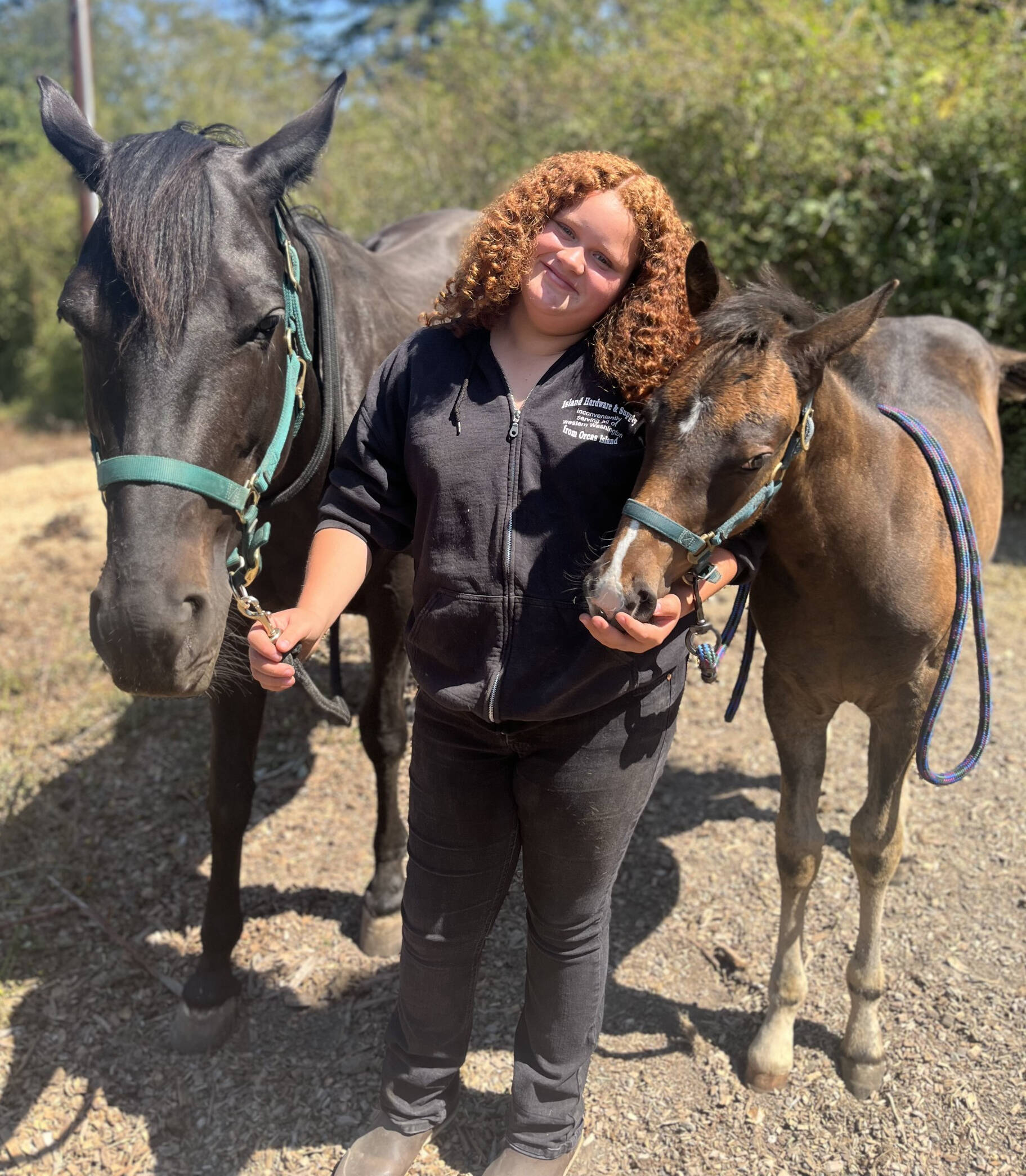Twelve-year-old Poppy Newberry has longed for a horse since she was a toddler.
After spending the last four years diligently taking riding lessons — and overseeing a menagerie of farm animals at her Deer Harbor home — Newberry’s parents agreed the time had come.
After finding the perfect mare online, the young equestrian could never have imagined her dream horse would arrive malnourished, lame and pregnant.
“She had such a kind eye but she was so scared,” Newberry recalls of their first meeting. “I was taken aback by how skinny and lame she was. She looked very different from the videos we had been sent. She also had wounds all over her abdomen. I knew she was pregnant, but no one believed me. It was at this point we realized we may have been scammed.”
The story of the mare’s travel across the country began in April. Newberry and her mom, Bridget Meyer, were looking for an older, friendly female horse when they came across a black bay mare named Poppy in New Mexico.
“My mom always said, ‘Okay, if you want a horse, you have to manifest it.’ I never believed her. Now I do!’ laughed Newberry.
The mom and daughter turned to each other and said, “oh my god, this is perfect.” Newberry called the owners to ask questions about Poppy, look at photos and videos and arrange for a vet check to ensure she was in good health. After everything was in order, Meyer paid and coordinated transportation.
Due to a tornado in Nebraska, they could not hire a horse hauler to transport Poppy from New Mexico to Anacortes. So they found a transport company that would take Poppy as far as Paso Robles, California, where Meyer’s sister lives. As soon as she saw Poppy, she knew something was wrong because the bones in her back and hindquarters were visible, and she had trouble walking. The horse stayed in California for four days and then journeyed to Anacortes, where she met her new family on April 21.
Poppy, now renamed Lucky, settled into her new home at Alicia Miller’s Cayou Valley Stables, where Newberry takes riding lessons. It was a rocky start for all involved. Lucky proved to be food-aggressive. It is believed she was starved and abused in her previous home.
“She had never seen grass before,” Meyer said.
She was also diagnosed with navicular syndrome, a degenerative condition in horses that affects the navicular bone and surrounding soft tissues in the foot, causing pain and lameness. Meyer did contact Lucky’s previous owners, who admitted the only vet examination she had was to approve her for travel and that she had “gotten out” a few times and possibly became impregnated then.
A local large animal vet attempted to assess Lucky for pregnancy, but she was too fearful for an exam. They did bloodwork but it wouldn’t be back for a week. Over the ensuing days, it became clear to Miller and Newberry that Lucky would be giving birth soon.
By May 10, Newberry began sleeping in the tack room adjacent to Lucky’s stall. She set an alarm for every two hours. After five days, in the middle of the night, she woke up to discover a newborn filly. Everyone spent the next few days vigilant with the new baby, and Newberry began imprinting, a way for handlers to bond with foals. She’s since worked with her daily and plans to keep her for at least a year, before assessing their next steps. Foals are not ready to ride until they are at least a few years old.
“We’re trying to give the baby a good childhood,” said Newberry, who is still undecided on a name.
Thanks to a high-protein diet, Lucky has gained 200 pounds. They’ve tried a variety of remedies for her legs, but her condition has not improved. Meyer has more appointments with specialists scheduled even though the past four months have cost the family thousands of dollars more than they anticipated. And her daughter still does not have a horse of her own she can ride.
“I’m not ready to give up on Lucky,” Meyer said. “We’re going to give her a really good life however that looks for her. We just don’t know yet.”
The filly is very close to being weaned now, and Lucky allows Meyer and Newberry to groom and touch her. However, everyone must still be careful when feeding her. Newberry says that in a perfect scenario, Lucky would be able to live out the rest of her life, which may not be long, in a pasture.
“She doesn’t feel comfortable in her body. The baby tries to play with her mom, but she doesn’t respond,” she said.
Next up for the family is the San Juan County Fair, where Newberry will show her 10 goats, most of which she bred. Her chickens, duck, cats and dog will stay at home.
“I like how when you are working with an animal, it has its own mind,” she said. “I don’t own them, I can’t control them. I love how sweet they are and they’re always there. I have a real connection with animals.”



